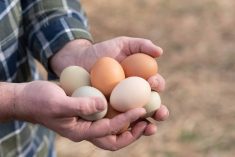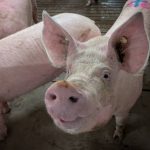Union general William T. Sherman once famously said, “War is hell.”
However you describe it, war is expensive. For some, it’s extremely profitable, too.
Shooting wars aren’t the only type of warfare that are costly, deadly and often without a winner. In January 2022, the International Monetary Fund estimated the total cost of the COVID-19 pandemic would be at least US$12.5 trillion.
Read Also

Agriculture, including the pork sector, has monsters to slay in 2026
Tariffs, trade protectionism and disruption; Uncertainty is weighing against what should be positive signals for Manitoba’s pork sector.
The human side of that coin is just as large. On Aug. 2, the United Nations World Health Organization estimated total COVID-19 deaths worldwide at seven million.
There are other, less visible victims. In 2021 alone, the UN calculated the pandemic more than doubled the number of “people experiencing acute food insecurity” from 135 million to 345 million globally.
Then, with global food aid programs already reeling, the Russian invasion of Ukraine struck another blow. U.S. wheat futures prices rocketed nearly 50 percent higher (from US$7.50 per bushel to US$11) as shipping and boycott threats ricocheted through global markets.
Even after the invasion-shaken markets settled into a less volatile, more predictable pattern, the number of food-threatened nations remained high and access to supplies continued to be threatened.
However, throughout the pandemic and Russian-Ukrainian war, one area of the global food system remained – and remains – well-fed and fat.
According to a Greenpeace International February 2023 report, “the world’s biggest agribusiness corporations made more in billion-dollar profits since 2020 than the amount that the UN estimates could cover the basic needs of the world’s most vulnerable…”
That math, Greenpeace explains, shows that “the 20 corporations – the biggest in the sectors of grain, fertilizer, meat and dairy – delivered US$53.5 billion to shareholders in the financial years 2020 and 2021, while the UN estimates a smaller figure, US$51.5 billion, would be enough to provide food, shelter and lifesaving support for the world’s 230 million most vulnerable people.”
Recent financial reports from Cargill, Bunge and Archer-Daniels-Midland show the trend not only continues; it’s getting even more profitable.
On Aug. 3, the Reuters new service wrote, “global commodities trader Cargill Inc. reported … its fiscal year 2023 revenue increased seven [per cent] from a year earlier to $177 billion, the highest ever for the 158-year-old company.”
Since Cargill is privately held, it doesn’t share all its financial data such as quarterly or annual profit. Competitors like ADM and Bunge, however, are publicly held and must post their financial results. “Both,” said Reuters, have “reported solid earnings” and have “raised their profit outlooks for 2023.”
The key reason for increased profits is as old as war itself: “Global supply disruptions, such as the ongoing war in Ukraine … have generated increased profit margins for grain merchants” and, no surprise, “concurrently opened up opportunities for firms like Cargill to step in”, explained BNN, an online global news service, on Aug. 3.
Equally unsurprising, prices for ag imports and services have also soared during COVID and the Ukrainian war years. According to a November 2022 report by the Institute of Agriculture & Trade Policy, the world’s 20 most industrialized nations “paid almost twice as much for key fertilizer imports in 2021 compared to 2020 and [were] on course to spend three times as much in 2022…”
So, yes, war is a cruel, unrefined hell where everyone, even the winners, are losers.















